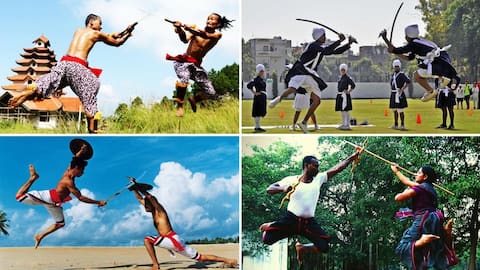Journey through India's martial arts heritage
What's the story
India, with its diverse cultural tapestry, has a long and storied history of martial arts that evolved over centuries. These combat practices, deeply rooted in tradition and philosophy, showcase the country's rich heritage and the integration of physical and spiritual well-being. In this article, we will explore five traditional Indian martial arts that have stood the test of time.
Kerala
Kalaripayattu
Kalaripayattu, recognized as one of the world's oldest and most scientifically developed martial arts, originated in the state of Kerala. Training regimen commences with a comprehensive oil massage for the body's agility and flexibility. Integral to Kalaripayattu are impressive physical skills such as chattom (jumping), ottam (running), and marichil (somersault) and mastery of various weapons, including swords, daggers, spears, maces, and bows and arrows.
Tamil Nadu
Silambam
This ancient martial art from Tamil Nadu which seamlessly blends elements of martial arts, yoga, and Ayurveda, ranks among the world's oldest combat forms. Individuals, known as "silambattamis," train with the distinctive weapon "silambam," a traditional bamboo stick approximately four feet long used for both offensive and defensive maneuvers. Practitioners are instructed in diverse techniques, encompassing strikes, thrusts, and blocks with this specialized weapon.
Manipur
Thang-Ta
Thang-Ta, originating in Manipur and often referred to as "the art of the sword and spear," seamlessly combines weapons such as swords, spears, and daggers with the internal discipline of physical control, synchronizing breathing movements. Certain sword and spear forms in Thang-Ta are mainly ceremonial, even though they involve practical techniques. These forms are specifically performed on special occasions or under unique circumstances.
Punjab
Gatka
Gatka, a traditional Sikh martial art, originated in the Punjab region. Developed by the Sikh Gurus to defend against external threats, Gatka incorporates both armed and unarmed techniques. In times when weapons were tools for fighting oppression, aiding the needy, and upholding righteousness, Gatka became a vital practice. Gatkaars engage in the art using weapons like swords, sticks, and daggers, accompanied by acrobatic movements.
Maharashtra
Mallakhamba
Mallakhamba, which translates to "pole gymnastics," is a unique Indian martial art that blends elements of yoga and wrestling. Originating in Maharashtra, Mallakhamba involves performing acrobatic and gymnastic feats on a vertical wooden pole made from sheesham wood, polished with castor oil. This art form not only enhances physical strength and flexibility but also fosters mental concentration and balance.
